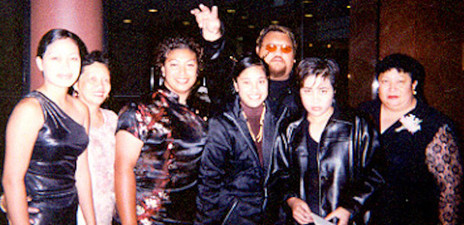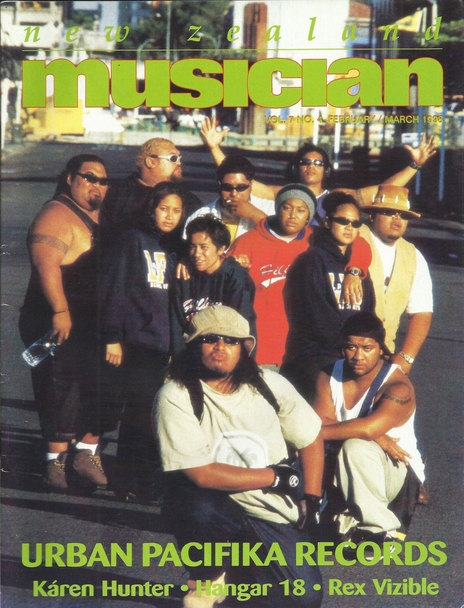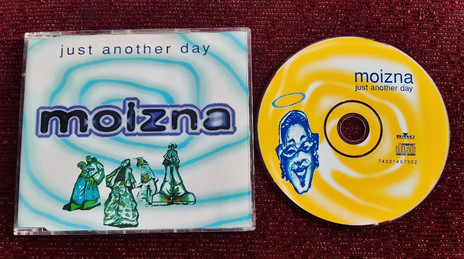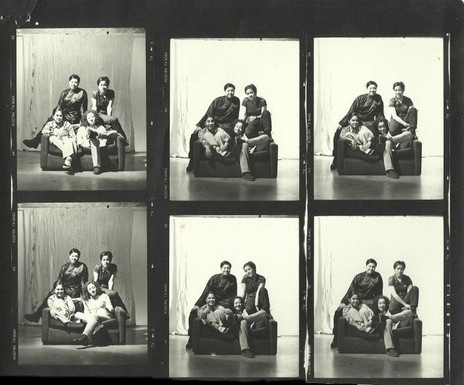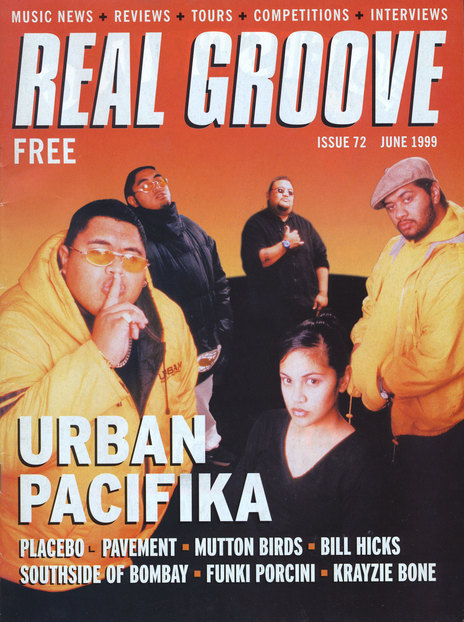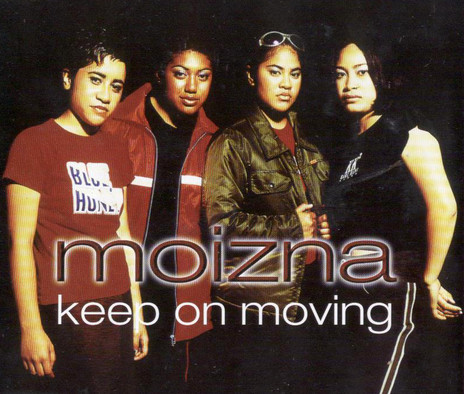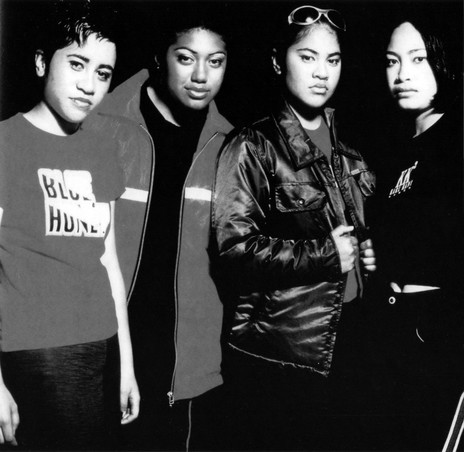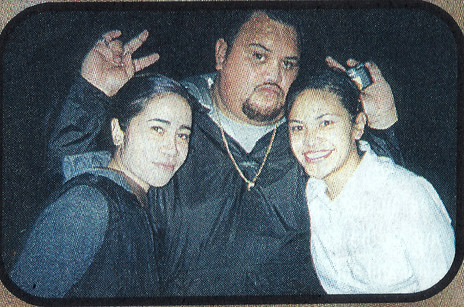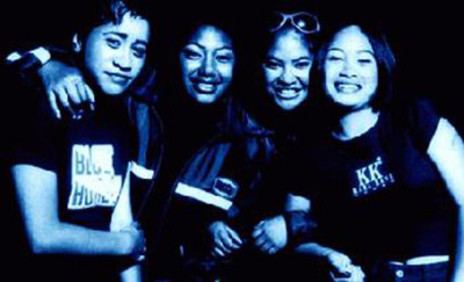In 1996, Maureen’s high-school music teacher suggested putting a group together for the school talent show. “I was just mucking around in the music room one lunchtime when I remembered the talent show was coming up,” she said. “I thought, let’s just throw some people together and see what happens.” Her first port of call was her classmates Natasha and Isabelle Siosiua. When they got together for their first practice, Isabelle brought along her sister Alesha, who was studying nearby at Avondale College.
Having spent time singing in the Avondale College jazz band, Alesha quickly offered some cheeky suggestions about their vocal arrangements. Rather than getting offended, the girls asked her to join the group. “I didn’t even know Alesha could sing,” Maureen laughed. “So when she started making suggestions about harmonies, I thought, cool, she knows what she’s doing. It worked out really well.”
As a teenager, Maureen made a habit of listening to R&B songs on the radio and learning how to play them by ear. After she borrowed a melodic phrase from ‘Real Love’ by American singer Mary J. Blige, they propped it up with a programmed drum machine beat and arranged the vocals.
Starting out, Moizna’s secret sauce was Isabelle and Alesha Siosiua’s skills at MC’ing
Their secret sauce, however, was Isabelle and Alesha’s skills at MCing. “We all thought we were rappers after we heard Lauryn Hill [from The Fugees],” Alesha says. “She was our main influence for rapping. When her music videos were playing late at night on television, we’d record them and play them over and over again.” Within a week, they were ready for the talent show.
Unbeknownst to Moizna, one of the talent show’s judges was the South Auckland music impresario Phil Fuemana. Phil was in the early stages of developing his label, Urban Pacifika Records, and he was looking for a female R&B group. Recognising Moizna’s potential, he reached out to the girls and their parents, setting in motion a series of events that would launch them into the spotlight.
“Phil felt that when you were looking after an artist, you had to meet their families and get to know them,” explains his sister, Christina Fuemana. “Us being Niuean gave Isabelle and Alesha’s family the green light and, by extension, Maureen and Natasha. I remember him coming home from the meeting and saying the Niueans were taking over West Auckland. He loved how one of the families owned four acres of land and had built four houses on it. He felt like he was in Niue when he was there.”
Alongside Moizna, Phil was already working with hip-hop group Lost Tribe, rapper Sani Sagala aka Dei Hamo, and R&B duo AKA Brown. Between their collective talents, Urban Pacifika Records was on the verge of something special. “Phil was very forward-thinking at the time,” enthused Isabelle. “Even though there had been Māori and Pacific hip-hop and R&B songs coming out for a few years by then, it was still very uncharted territory. Phil realised there was a call for more brown faces singing our stories from a hip-hop and R&B perspective. He was inspired by overseas music, but he knew we had to identify where we were from clearly.”
That year, Phil organised an Urban Pacifika Records artist showcase at the Powerstation in Auckland. Philip Bell, aka DJ Sir-Vere, was in the audience that night. At the time, he was working at BMG (later Sony Music). When Moizna hit the stage, his jaw dropped. “It was one of those moments when you see a group for the first time and fall in love with what they do,” he remembered. “The next time I went into the BMG office, I told [the A&R] Kirk Harding about how Phil had all these great acts.” Shortly after, Phil inked a label deal for Urban Pacifika with Harding at BMG.
In 1997, Natasha departed from the group, and the remaining members of Moizna went into the Kaiun Digital Production studio facility with Phil and engineer Simon Holloway. Between their wide-eyed teenage approach to songwriting and Phil’s substantial studio experience, they struck gold with their debut single, ‘Just Another Day’. Equal parts R&B and hip-hop, the song landed in the sweet spot between Moizna’s American influences and their love of Auckland groups and solo artists like Sisters Underground, Sulata, 3 The Hard Way, Moana and The Moahunters, Che Fu, and Teremoana Rapley.
Accompanied by a New Zealand On Air-funded music video directed by Supergroove bassist and filmmaker Joe Lonie, ‘Just Another Day’ benefited from initial radio and television support from bFM, Mai FM and Max TV. The song peaked at No.6 on the New Zealand Top 40 before eventually receiving a gold sales certification in 1998. In the process, Moizna won fans nationwide.
‘Just Another Day’ channeled the grooves of Sisters Underground’s ‘In The Neighbourhood’
Reflecting on their early days, Isabelle remembered Moizna being impressed by the breezy grooves and everyday life stories that powered Sisters Underground’s ‘In The Neighbourhood’. From her perspective, they’d aimed to channel a similar feeling with ‘Just Another Day’. “We could identify with what they were talking about,” she said. “They were lighthearted but they were still pointing towards what they were experiencing in South Auckland.”
As a teenager at the time, West Auckland rapper and musician Tom Scott (Home Brew and Avantdale Bowling Club) used to love seeing Moizna on Max TV. “Moizna and Ma-Ve-Elle were the gold standard for R&B,” he said. “That’s my DNA for sure.” Interestingly enough, 11 years after ‘Just Another Day’ came out, Tom and his Home Brew producer, Haz Huavi, came to national prominence by recording an EP based on everyday life, Last Week. “We’ve legit got a song called ‘Just Another’ and another 10 songs that start with [the words] ‘just another’,” he laughed. “Sometimes that’s all that’s happening.”
Near the end of 1997, Moizna released their second single through Urban Pacifika, ‘Keep On Movin’, again backed by NZ On Air. Thinking back, Isabelle remembered the group being inspired by the futuristic hip-hop records that US rapper Missy Elliott was recording with producer Timbaland. They were also captivated by the surreal music videos that accompanied them, directed by US filmmaker Hype Williams.
When Moizna returned to the studio with Phil and the video set with Joe, they put their own spin on Missy Elliott and Hype Williams aesthetics. “We tried to continue with the same theme of, ‘hey, it’s just another day, and life is good,’” says Isabelle. This time, however, they were joined in the studio by a new member, Rita Tuiala. “Alesha brought her along to one of our practices,” Maureen remembered. ‘I liked her because she had a totally different vibe to her singing. We were all different in our own ways, but when we were on stage or in the studio, we blended together perfectly.”
Although ‘Keep On Moving’ wasn’t as commercially successful as ‘Just Another Day’, it still made it into the NZ Top 40, hanging around in the charts for several weeks. “I think some parts of ‘Keep On Movin’ were actually more elevated than ‘Just Another Day’,” says Isabelle. “It showed a really good progression in the creation of our music.”
Over the following year, Moizna continued to work in the studio with Phil and the rest of the Urban Pacifika Records roster while they recorded material for the label’s landmark release, the 1999 Pioneers Of A Pacifikan Frontier compilation. They also recorded two new songs for the collection, ‘Summer Goodbye’ and ‘I Need 2 Know (The Flow)’, featuring Dei Hamo, and added vocals to other tracks like ‘One’. Sani Sagala, aka Dei Hamo, recalls that working with Moizna was effortless. “Bro, it wasn’t even work,” he says. “It was just having fun with family.”
Dei Hamo says working with Moizna was effortless. “It was just having fun with family.”
Outside the studio, Moizna also often spent time with Phil, Sani and the rest of the Urban Pacifika Records crew when they played showcase gigs around the country or visited radio and television stations on media days. “Even though they were teenagers, they always carried themselves very professionally,” says Sani. “They were so ahead of their time and so conscious about what they put into their lyrics. I really loved that about them.”
Despite the success they’d experienced, as the 2000s dawned, Moizna found themselves at a crossroads before agreeing to go their separate ways. “It was a honeymoon period,” Isabelle explained. “After we finished high school, we started asking ourselves if this was really going to be a viable career for us.” Not long after, she settled into a nine-to-five job before eventually moving to the Gold Coast to raise a family.
Alesha gave birth to her first child before relocating to the United States with her husband. There, they found work in the Pacific music scene; they later moved to Brisbane, where she fronts their successful and well-established family band, One Sound. Rita, on the other hand, took a job as an air steward before sadly passing away in the early 2000s. “There was only ever one Rita,” says Alesha. “She had a vibe, and she was very straight up.”
This brings us back to Maureen. After Moizna wrapped up, she spent the next few years travelling on and off before putting down the microphone and focusing on family and a career in hairdressing. “I tried doing music again a few times with friends, but it just wasn’t the same anymore,” she says. “At the time, Moizna kind of started as a joke, but after seeing where it was taking me, that joke allowed me to realise many of my dreams.” “We were always laughing when we were together,” Alesha chuckled. “As you can see, we’re still laughing now.”
Moizna’s music remains in the psyches of a generation of NZ hip-hop, R&B, and pop lovers
Twenty-seven years after they released ‘Just Another Day’, Moizna’s music remains firmly embedded within the psyches of a generation of hip-hop, R&B, and pop lovers in New Zealand—and increasingly, their children and grandchildren. Although their music isn’t available on other streaming platforms, you can find their songs on YouTube, littered with nostalgia comments left by adults who were teenagers in the 1990s. “When we were writing, we were just reminiscing on what was going on in our lives as teenagers,” says Isabelle. “Everything felt easy back then. We didn’t have smartphones, social media, or bills to pay. We just had to show up at school and do our homework. It was a really good time to grow up and express ourselves artistically.”
“Moizna were four beautiful young Pacific women from different backgrounds,” said Christina Fuemana. “Together, they were the new hip-hop and R&B group with a new sound who became part of the Urban Pacifika family and my brother Phil’s life and dreams. They were all so gifted and a pleasure to be around. Thanks to social media, I’ve seen our little sisters grow into these beautiful women with beautiful families. Alesha is still quite huge in the Pacific music community in Brisbane. I hope to see her and the other girls in action again one day.”
